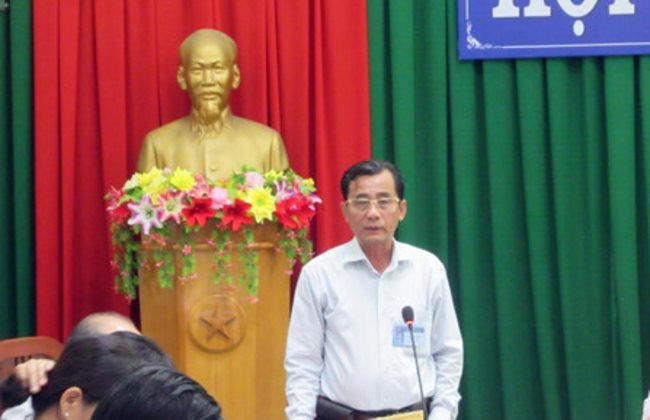 |
|
Do Ngoc Diep chaired a press briefing while serving as the chairman of Phan Thiet City, which is located in the south-central coastal province of Binh Thuan. He is now charged with land mismanagement – PHOTO: TNO
|
Phan Thiet City is located in the south-central coastal province of Binh Thuan.
A source told Thanh Nien newspaper that the investigative police agency of Binh Thuan Province had initiated legal proceedings against the 57-year-old Diep, who also served as chairman of the city’s people’s council, based on Article 229 of the 2015 Penal Code.
Diep was placed under house arrest from Monday, and his house was searched later that day.
On December 9, the Party unit of Binh Thuan Province dismissed him from all of his Party posts.
Investigators also charged Le Ho Khai and Nguyen Tri, employees of the Division of Natural Resources and Environment of Phan Thiet City, for their involvement in the case. Khai was detained while Tri was placed under house arrest for the same charge.
The inspection committee of the provincial Party unit stated that as the Party deputy chief and chairman of Phan Thiet City between 2016 and September 2018, Diep had approved plans for land use in three rural communes: Thien Nghiep, Tien Loi and Phong Nam.
His approvals went against the city’s land use plan for the 2011-2020 period and the province’s land use plan for the 2011-2015 period.
More specifically, Diep signed 33 unlawful decisions, which enabled the conversion of more than 50,600 square meters of agricultural land to housing land.
Meanwhile, his 50-year-old deputy, Tran Hoang Khoi, vice chairman of Phan Thiet City, who was detained in September this year for the same charge, signed 100 similar licenses for converting over 120,000 square meters of land.
The chairman, Diep, failed to oversee land management and construction in the city and was lax in handling land and urban order violations, leading to the unauthorized development of residential areas.
Inspectors found that local authorities had intentionally and arbitrarily breached regulations for determining the size and locations of land plots and those for determining land use purposes before applying land use conversions.
These actions allowed a number of individuals to divide their farmland for sale as housing land, which resulted in disruptions to land and construction plans and losses for the State budget.
As part of initial investigations, inspectors checked five cases of land use conversions and found total losses of more than VND5.7 billion (US$245,000) for the State.SGT
 Former Party deputy chief and chairman of Phan Thiet City Do Ngoc Diep has been charged with land mismanagement as he signed 32 unlawful decisions approving the conversion of farmland to housing land in rural areas.
Former Party deputy chief and chairman of Phan Thiet City Do Ngoc Diep has been charged with land mismanagement as he signed 32 unlawful decisions approving the conversion of farmland to housing land in rural areas.